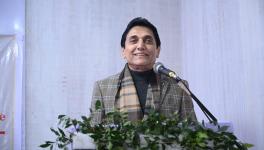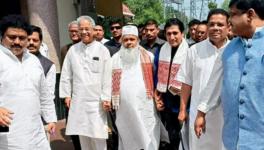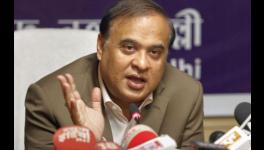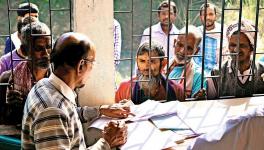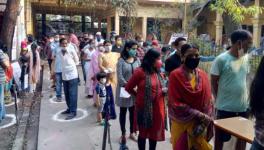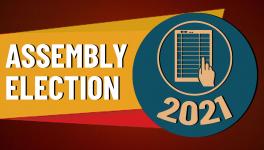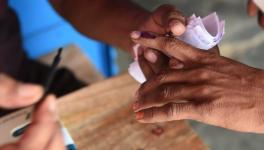Citizenship Bill: BJP’s Grand Strategy to Woo Voters in West Bengal?
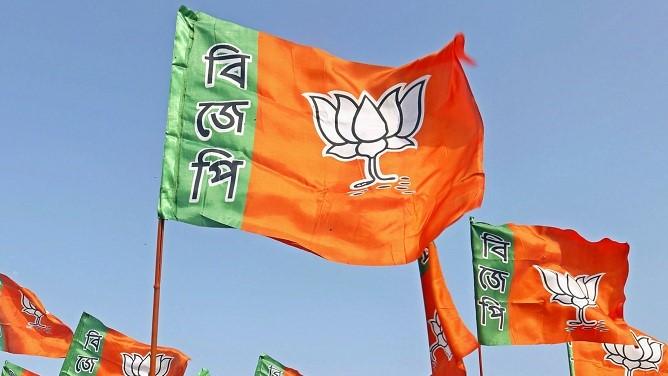
Will Bharatiya Janata Party’s (BJP) good electoral showing in the North East blow up on its face over the Citizenship Amendment Bill? Or is this a grand strategy to woo voters in other states, as the party prepares for the national elections. The North East has just 25 seats in Lok Sabha, while West Bengal has 42. It is well known how the BJP big-wigs have been setting their eyes on the state in the last few years. So, will pushing through the Citizenship Amendment Bill help the party win Bengali Hindu votes in that crucial state?
Assam is boiling over as anger at changing clauses of the Citizenship Act 1955, is spilling onto the streets. The new provisions in the Bill are seen in Assam as a carte blanche for legitimising Hindu immigrants from Bangladesh.
The Bill first placed in Parliament in July 2016, aims to amend the Citizenship Act of 1955 to allow Hindus, Sikhs, Buddhists, Jains, Parsis and Christians from neighbouring Bangladesh, Afghanistan and Pakistan eligible for Indian citizenship.
The government hopes to make the process much easier for these categories of people by reducing residence provisions of applicants from 11 years to six years. The aim is to accommodate Hindu minorities. The Bill makes illegal migrants eligible for citizenship on the basis of religion, which is regarded as a violation of Article 14 of the Constitution that guarantees right to equality. It could be contested in Court. The BJP’s argument is that as India is a Hindu majority country, where else would these people seek refuge.
The Citizenship Amendment Bill, 2016, was passed in the Lok Sabha on Tuesday and has raised temperatures in Assam and the North East. The BJP’s regional ally, the Asom Gana Parishad (AGP), has already pulled out its ministers from the state government.
The AGP was a party formed by student leaders who had led a mass movement against alleged foreign nationals from Bangladesh who they said had changed the demographic pattern of the state, and reduced the local Assamese to a minority. The fear was that Assam would in the near future become India’s second Muslim majority state, after Kashmir. The AASU (All Assam Students Union) wanted the names of foreign nationals deleted from the electoral rolls and steps be taken to preserve the cultural identity of the majority Assamese-speaking citizens. That was written into the Assam Accord that was signed in 1985 by the Congress government at the Centre, the state government and the AASU and the All Assam Gana Sangram Parishad (the citizens’ body and small regional outfits that spearheaded the movement with the students) leaders. The cut-off date for identification of foreign nationals was midnight of March 24, 1971, as it was the date when the Pakistan Army action against Bengalis began in former East Pakistan. All those who entered Assam before that date would be considered citizens while those coming in later, would be foreigners, as per the Accord. Those overstaying would be detected and deported.
Though the Assam Accord of 1985 brought the movement to a close, nothing much happened. The AGP leaders took office in the election that followed. But even the student activists now in government made little headway in detecting and deporting the alleged foreigners, as they settled into their new role as ministers.
It was finally the Supreme Court which got the ball rolling when it ordered the Assam government to update the National Register of Citizens (NRC). There is no mention of the NRC in the Assam Accord. The Accord does not say that the 1951 NRC would be updated as per its cut-off date. In merely said that “foreigners shall be detected in accordance with the provisions of the Foreigners Act, 1946 and the Foreigners Tribunals order, 1964”.
But the updating of NRC has by default become about focusing on who is and isn’t a citizen of the state. The two have become enmeshed. Now, with the government bringing in the Amendments to the Citizenship Act, the Assamese fear that Bengali Hindus are being favoured by the BJP government.
The latent anger of Assamese-speaking people against Bengali Hindus over language, which in the past has even led to riots, is now resurfacing. In the past few decades, as the movement against alleged Bangladeshi foreigners gathered momentum, language rivalry had taken a backseat in Assam. Today, the Bengali Hindu issue is coming to the fore because, according to reports, the majority of the alleged foreigners in the final NRC draft are Bengali Hindus. The fear is that Bengali Muslims and Hindus combined could well make Assamese-speaking people into a minority in the state. This is why the talk of protecting Assamese identity.
The BJP is aware of this, which is why the Union Cabinet announced last week that a high-level committee would be set up to implement Clause 6 of the Assam Accord, which deals with preserving the identity of the local people of the state. Clause 6 says: “Constitutional, legislative and administrative safeguards, as may be appropriate, shall be provided to protect, preserve and promote the cultural, social, linguistic identity and heritage of the Assamese people.” Home Minister Rajnath Singh told reporters after the cabinet briefing that Clause 6 of the Accord “wasn’t fully implemented.”
Apart from this, the BJP government, with an eye on the upcoming general elections, is taking measures to reassure sections of Assam’s local population. It announced that it would soon introduce a Bill that declares six communities, including tea tribes, Chutia, Matak, Moran, Tai Ahom and Koch Rajbongshi, as Scheduled Tribes. By doing so, the BJP hopes to win over these sections of the indigenous people. The party feels this will help it offset the support loss among the Assamese middle class and rural population, which had voted for the BJP in the Assembly elections. According to its calculation, the party expects to get roughly around seven Lok Sabha seats, the same as in 2014.
By pushing the Citizenship Bill, the BJP has taken a calculated risk as it believes that this move would help the party in West Bengal, which has 42 Lok Sabha seats. The BJP’s friends and allies in the North East, such as the National People’s Party in Meghalaya, Nagaland’s Peoples Democratic Alliance partners, as well Mizo National Front of Chief Minister Zoramthanga, are all opposed to the amendments.
Xenophobia is part of the northeastern psyche when it comes to all “outsiders”, including people from other Indian states as well as Nepalis. As in Kashmir, “outsiders’’ are not allowed to purchase property in the tribal states of the North East: Mizoram, Meghalaya and Nagaland. The Mizos are worried about Buddhist Chakmas crossing over from the Chittagong areas of Bangladesh. Arunachal is concerned that the new amendments would encourage Tibetans and Chakmas to settle in the state. Bengali speakers across the region are being viewed with suspicion. The inner line permit is a long-standing demand in Manipur and Meghalaya. The tribals of Tripura are also against the new Bill. If it does not help the BJPs election agenda, the Bill will not be pushed. But if the BJP thinks it can be a game changer in Bengal, it will do so in the next Parliament session ahead of the general elections.
Meanwhile, civil unrest is spreading like wildfire in the region. Assam is back to the days of hartals, general strikes, and public rallies, much like during the movement against foreign nationals. The people of Assam had given Narendra Modi a resounding victory in the 2016 state elections by voting a BJP government to power for the first time in the state. Since then, the party has been gaining in the North East. The BJP won Tripura and Manipur, too, and manipulated to ensure that arch rival Congress is kept out, and has made much of the fact that the North East has become ‘Congress mukt’.
But now the Assamese majority are shocked at the turn of events, as they were hopeful that an ultra-nationalist party like the BJP, unlike the Congress (which is blamed for using illegal foreigners as a vote bank), would ensure that Bengali-speaking Bangladeshi Muslims are thrown out of the state. While the Brahmaputra Valley, which is mostly Assamese-speaking, is seething with anger, the Bengali majority in the Barak Valley have welcomed the Centre ’s move. Prime Minister Modi, in a recent visit to Silchar, spoke about the need to correct a “past injustice”. Speaking on the Citizenship Amendment Bill, Modi said: “It (the Bill) is connected to the emotions and lives of people. It is not for the benefit of anyone but a penance for the injustices done in the past.” He was speaking at a public rally in Silchar, and his speech was interrupted by thunderous applause from the crowd.
Assam has 14 Lok Sabha seats, of which just two are in the Barak Valley. Political pundits believe it is with an eye on West Bengal that Chief Minister Mamta Banerjee is projecting herself as the defender of Bengali rights. She sent a Trinamool Congress team to Assam following the killing of Bengali labourers in Upper Assam. BJP and Narendra Modi, on the other side, would like to create a counter-narrative by coming to the rescue of Bengali Hindu refugees.
However, the mood in Assam is angry. Several Assamese people say that if Bengali Hindus are accommodated because of their religion, it will go against the provisions of the Assam Accord, which has the cut-off of March 24, 1971 to identify foreigners. Left parties as well as liberals across the spectrum are opposing citizenship being granted on religious considerations. It remains to be seen how these currents and counter-currents finally play out.
(Seema Guha is a senior journalist who has been covering foreign policy and the North East for decades. The views expressed are personal).
Get the latest reports & analysis with people's perspective on Protests, movements & deep analytical videos, discussions of the current affairs in your Telegram app. Subscribe to NewsClick's Telegram channel & get Real-Time updates on stories, as they get published on our website.










